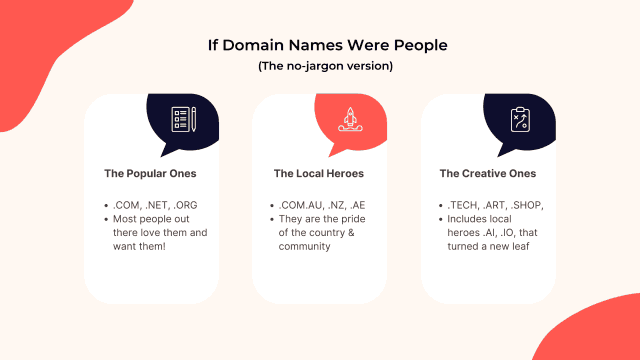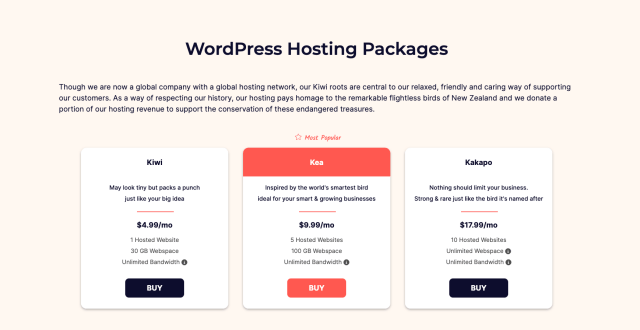Domain hosting vs web hosting – confusing, right? As you’ve been researching how to build a website, you’ve likely encountered two common questions: firstly, what are they? Secondly, do you just need a domain to get online, or do you need hosting?
A recent study found that a staggering 27% of small businesses don’t have a website. You don’t want to be like them and miss out on the benefits of a website. Difficulty understanding the difference between domain hosting vs web hosting is the first obstacle to overcome.
Web Hosting vs Domain Name Explained in Simple Terms
Many people starting out on their website creation journey just aren’t aware that these two elements are totally different. Website hosting and domain names are both essential to any website, but they are also unique components of the bigger picture.
What Is a Domain Name? Your Internet Address
A domain name is the way your customers can find you. It’s similar to your real-world address. What makes it different is that this address is virtual. Domain names are made of a top-level domain (.com, .org) and a second-level domain (onlydomains, google).
Just like a home address, each domain name is unique and points to only one location. Instead of having to sift through cyberspace to find a website, you can simply type a name such as “facebook.com.”
The tricky part is that instead of names, underneath the surface actual online locations are known as IP addresses; a string of numbers like 192.165.0.1. Your target audience will have one heck of a time remembering that. (With smartphones, who even memorizes phone numbers these days?)
Domain names allow you to create your online address. Ideally, you could purchase a domain name that is your business name followed by a .com, .org, .io, or whatever is most relevant. Customers will then type your domain name into their web browser.
Once your domain name has been entered into a web browser, the browser connects to a directory known as the Domain Naming System (DNS). This server looks to match your domain name with its known IP address.
For the customer, this happens in a matter of seconds or less.
What Is Web Hosting? Your Internet Home
Web hosting is like an apartment building. Only this building houses almost infinite rooms on physical servers, and you pay hosting services a monthly or annual fee to “rent” space.
As a tenant, you use the space as you see fit, whether that be storing your content, website code, or other files. This includes images, video, and transactional data. The host gives you an online presence to display your stored content to website visitors.
Maybe this is an apartment complex that comes with luxury features such as a pool, gym, and function rooms. Well, with web hosting, these perks are computer-based. CPUs, RAM, and server storage are the basics. Premium websites will need optimal data bandwidth and redundant data centers for storing website backups in case the worst happens.
Web hosting plays the role of your virtual ‘landlord’. The host is responsible for the upkeep and maintenance of this online property. Providers update servers and other infrastructure to maintain security, compatibility, and performance.
Good web hosting platforms ensure high-performing websites with fast page loads.
How Do Domain Name and Website Hosting Work Together?
Web hosting and domain names work hand in hand to deliver your website to Internet users. The domain name directs users to your virtual space. Web hosting provides the online space for users to interact with your brand.
In the real world, customers need an address to find a brick-and-mortar store. If you have a confusing address (or just no address at all) they won’t find you. But if they do find you and you’ve a crap building, then customers probably won’t even enter your shop to make a purchase.
If either hosting or the domain is missing, you won’t be able to connect to your online customers. But together, they both provide a convenient shopping experience for your potential clients.
Do I Need Both Domain and Hosting to Build a Website?
Yes, you need both a domain name and a hosting service to build a website. But it’s possible to get both components from a single place (like OnlyDomains) that can help you set up a domain name with a hosting solution.
These services provide several hosting options to fit your needs. For example, a professional portfolio needs less bandwidth resources than an e-commerce website.
Can I Buy Domain Name and Website Hosting Separately?
Yes, you can buy a domain name and website hosting from separate places. That said, many businesses only provide domain name registration or website hosting.
Using two separate vendors makes building a website more complicated, as it means directing your domain registrar to your hosting provider’s nameservers. These connect your purchased domain URL to the IP address of your host’s servers.
If you buy both services from one provider then it’s easier to get your site up and running, allowing you to manage everything from the same place.
How Much Should I Pay for Domain and Hosting? Counting the Cost
The costs for domain names and hosting services can vary widely. Purchasing a domain name is where you will find the most volatility as domain name speculators make a living snapping up names with any perceived value.
In the early stages of the Internet, having a .com domain name was considered highly valuable and could command eye-watering figures. Even more recently, in 2019, voice.com sold for $30 million.
Thankfully, new top-level domain (TLD) names such as .io, .tech, and .sg are on the rise. Being flexible about TLDs and second-level domains (SLDs) saves you money. The cost of a domain name starts from $1.99 per year, but expect to pay somewhere between $8.99 and $19.99.
Of course, hosting costs all depend on what resources you need. Do you need a website to handle high-traffic volumes and electronic transactions? Or do you need a simple site for a blog or to spread brand awareness?
Reputable web hosting services like OnlyDomains start as low as $4.99 per month. These come with business email and Secure Sockets Layer (SSL) encryption. SSL is a must for protecting customer data and is also a requirement for gaining authority with the Google Gods. Meeting security standards is plain old search engine optimization (SEO) and will help you rise up the search engine rankings.
Choosing a Domain Name and Hosting Service: Best Practices and Tips
Once you are done building your website, the next step is to focus on growing your business. However, this only works if you get your domain and hosting right first time around, and you can really hit the bullseye by following these best practices:
Understand TLDs
In most cases, your domain name is made up of a sub-level domain and a top-level domain. The SLD is the “onlydomains” part while “.com” is the TLD. The SLD is the part that appeals to your target audience, while the TLD is simply a necessary part of domain names.
There are several types of TLDs:
- Generic top-level domain (gTLD): Most commonly used including .com, .net, .biz, and .org.
- Country code top-level domain (ccTLD): These are sovereign territories or countries. Examples include .in (India), .sg (Singapore), and .au (Australia).
- Sponsored top-level domain (sTLD): Examples include .gov, .edu, and .mil. Restricted for use only by specific organizations or groups.


When making the decision that is best for you, remember to choose a TLD that is fit for purpose. For example, if you operate in the UK, then .co.uk may be a no-brainer. If you represent a non-profit then .org is well-suited.
Bear in mind that what works best will depend on the nature of your business and where your customers are based.
Look Beyond the Dotcom
According to Statista, .com makes up 47.8% of TLDs worldwide, while .org comes in at a “close second” at 4.7%. It’s a common misconception that people still have the habit of adding .com to whatever sub-level domain they type. A recent report found that the number one search query on Google was “google”, meaning users were simply typing the website’s name with no TLD at all.
These days reliance on .com is a thing of the past. Today you have endless possibilities at your disposal if you are creative. Steering away from popular SLDs and TLDs can save you big bucks, and going for something different also helps you stand out from the crowd.
Other Domain Naming Tips
Choosing a domain name is not to be taken lightly as it can really make or break your business. Check out these several tips to guide your search for the perfect online address:
- Keep it short: Less is more, keep your domain name to longer than four words.
- Avoid hyphens: Adding these makes things more confusing
- Easy spellings: Use words that don’t require a university education
- Keywords: Include target SEO keywords when possible
- Name generators: Try one out to break out of a creative funk
How to Find a Hosting Service
When it comes to domain vs web hosting, a good piece of advice is to have different strategies for when it comes to hosting. It is so important to think about what you are looking for from your host and what your business really needs to succeed. Take on board these useful pieces of advice:
Identify the type of hosting you need: Web hosting, virtual private servers (VPSs), WordPress hosting, and cloud hosting all suit different business types.
Read hosting service reviews: Look for comments about customer service. Additionally, take note of how user-friendly a provider is to use.
Get enough bandwidth: Whatever you settle on, make sure you have more than enough bandwidth to handle your expected traffic. That said, many providers, such as OnlyDomains, do allow you to change your bandwidth if you need to in the future.
Align speed and uptime with your needs: Check user reviews and a provider’s service level agreement (SLA). Look for fast website performance and uptime that suits your business. A 99.999% uptime guarantees your website will virtually never go down, but it may cost more.
Don’t force a solution into your budget: Web hosting doesn’t have to cost an arm and a leg. The best way to do it is to choose the package that you need and not what you want to fit within a predetermined budget. Having a high-performing, usable website will pay off dividends in the long-term.
Be prepared for growth: Pick an option that offers unlimited scalability. This will allow you to grow the business without migrating your web assets.


Where Can I Find Free Website Hosting and Domain, and What Are the Pros and Cons?
There are plenty of options available for free website hosting with a hosted domain. Some web hosting providers offer free and unlimited domain hosting without any advertisements or hidden costs. Let’s take a look at some providers:
- WordPress.com (WordPress.org is a different entity)
- InfinityFree
- 000webhost
- ByetHost
- Googiehost
Other services like Bluehost and HostGator offer free domain registration for one year, however you will have to pay for a year’s worth of hosting.
The Pros
When deciding what is open to you when making the right decision for your business website, it is crucial to weigh up the positives and negatives. That said, free web hosting and domain providers offer several advantages:
Save Money
Anytime something frees up your capital, you can invest in other business areas. You won’t save a lot, but it could make a difference.
Testing Benefits
Free domain and hosting solutions offer a risk-free avenue to experiment, which is great for web developers trying their hand at design. Keep in mind, however, that this could be difficult to migrate a successful site to a paid service.
Quick and Easy
Many ‘freemium’ services help you with registering a subdomain and web hosting, offering free templates and website builders that help get you online as quickly as possible.
Make Use of Extraneous Domain Names
If you’re an ‘ideas person’ you’ve likely a domain name or two sitting in an account. There are many good ideas for using your domain name with a free hosting service, one of those being to redirect users to your newly built website.
The Cons
Attractive benefits and free options may seem like a dream come true, but there are also many disadvantages to opting for a free domain or hosting solution that it is important to be aware of.
Name Attachments
You will get a free domain name, but it will be attached to the merchant’s subdomain. For example, it would be yourname.wordpress.com vs yourname.com. Not exactly the professional look you are after.
Advertisement
Nothing in this world is free. Users who access your website will be battered with ads inserted by the hosting provider. (They’ve got to make money somehow). This hurts the user experience and also prevents you from using ads for future revenue.
Hurts SEO, Less Professional
Funky subdomains or annoying ads all add up to a less reputable website. It’s not only Internet users who will take note, Google will also lower your ranking in relevant search results. And lower rankings mean less organic traffic, something you really don’t want.
Low Security and Poor Performance
Free hosting services don’t have a lot of motivation to stay updated, and so they will invest as little as possible in cybersecurity and website responsiveness. This leaves your website and your customers vulnerable to attacks, also leading to higher bounce rates as frustrated users hit that back button due to long page loads.
Build the Website of Your Dreams With Unlimited Hosting Plans and Domain Names Under Your Control
Thanks to modern tools, anyone can build a stunning website that drives business growth. OnlyDomains not only offers competitive pricing for domain name registration, but you also get more than a single service as our domain names come with Whois Privacy to protect your identity.
Additionally, we provide DNS Management tools for greater website control. Should you have any questions, just tap into our 24/5 Phone support that is ready to help you.
The question of domain vs hosting is not an either/or, you need both for an effective online business presence. So, find your ideal domain name, then sign up for unlimited hosting with OnlyDomains today.
